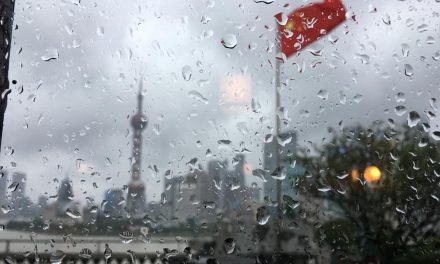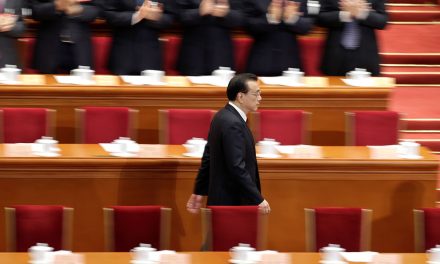BY LIANCHAO HAN AND BRADLEY A. THAYER
While small states seldom take the lead on big issues, they can sometimes state truths that larger states seem reluctant to perceive or comprehend. Cases in point are the statements by Lithuania’s president, Gitanas Nauseda, identifying the present as the “most dangerous situation since regaining independence,” and Latvia’s defense minister, Artis Pabriks, that Germany’s “immoral and hypocritical” relationship with Russia and China has driven a wedge between western and eastern Europe.
Germany has refused to send lethal aid to Ukraine and prohibited at least one Baltic state from sending former German arms to aid Ukraine. German companies have threatened to leave Lithuania over its support for Taiwan and for hosting a de facto Taiwanese embassy in Vilnius. The German reaction to the security concerns of NATO allies, especially of Estonia, Latvia and Lithuania, seems insouciant and thus dangerous. As Pabriks told the Financial Times, the Germans “have been living in peace for years. They think about gas, exports and cooperation. For us border countries, it’s different. For us it’s existential. Our past doesn’t give much chance of just trusting [Russia]. It would be death for us.”
While Pabriks’s comments stemmed from Russia’s threat, they captured three fundamental truths that the U.S. should heed concerning China’s influence. First, like the Germans, the U.S. has been living in peace for years while China has been at war with America. The Chinese Communist Party (CCP) waged war on the U.S. as long ago as 1949. Americans knew this during the Cold War. Conflict with China during the Korean and Vietnam wars, and in the Taiwan Straits Crises, concentrated the American mind on the threat from the CCP.
Second, also like the Germans, Americans have been thinking in terms of business profits, economic exchange and the advancement of cooperation. In the U.S. case, this was not with Vladimir Putin’s Russia, but with China. Russia’s influence with Germany is rooted in its supply of energy. A future where Germany returned to nuclear power would witness the decline in Russia’s influence over Germany’s politics and economy. Were the U.S. so fortunate that simply turning off the natural gas tap could check China’s influence. Decades of China’s infiltration into U.S. politics, finance, academe, industry, Big Tech and media have provided China with a seemingly permanent place in American life, with leverage in each sector.
Third, Nauseda and Pabriks and their Baltic and Central and Eastern European colleagues understand existential conflict. Their nations were under imperial Russian occupation before Estonia, Latvia, and Lithuania existed as independent states after World War I. Their existence was extinguished by Soviet occupation in 1940, an occupation which continued under the Nazis, then Soviet once again, before it was free at last once the Soviet Union collapsed. Estonia, Latvia, and Lithuania entered NATO in 2004.
Nauseda and Pabriks’s remarks stem from a harsh history in which their states were extinguished by dictatorships. Unfortunately, this past is not appreciated by the many in the U.S., where the continued relationship with China — despite the existential threat from the CCP — seems to be the 11th Commandment of American politics. But the U.S. is engaged in an existential struggle as profound as Latvia’s. The threat is as significant, although its form will not be a ground invasion. Instead, the threat is the influence that the CCP possesses on free societies. This influence has been permitted and sustained not only by the CCP but by those working in support of its interests.
The U.S. must heed the lessons that its Eastern and Central European allies have learned, having paid a high tuition to the Nazis and Soviets. Although the U.S. has maintained world dominance for almost a century, a profound complacency since the end of the Cold War has made our leaders insensitive to the imminent danger.
Second, the U.S. must move from a paradigm of cooperation to one of contest. This requires that the U.S. truly understand the China threat by identifying the evil nature of the CCP. The U.S. must then identify its vulnerabilities and address them while locating China’s and exploiting its vulnerabilities. The U.S. must arrest and counter China’s strategy for penetration and exploitation of not only free-world states but all countries where China’s presence is defined by exploitation of people and the environment.
This effort will have to be tailored to each country, but should include eliminating Chinese influence in a country’s politics, media, economy and technology. This will require a sustained and persistent effort. A first step would be identifying how China exerts direct and indirect influence in the country. A second would be to exclude Chinese technology from a state’s IT systems.
Many more actions will be necessary. The U.S. and the rest of the world permitted China’s economic tendrils and moneyed branches to form an iron pleach, which captured these societies. The West has permitted Beijing’s influence to be far greater than that of any other U.S. enemy.
Third, fundamentally, the U.S. is not yet serious about this existential conflict because many of America’s elite still do not see China as a threat. As long as the nature of the threat is ignored by Wall Street, Silicon Valley, universities, major media and politicians of both parties, the U.S. has not committed to the fight to the degree that will be necessary to win it. Wall Street and Silicon Valley should not be allowed to ignore the threat any longer.
The private sector should create a China threat education program, including counterintelligence and economic espionage, which government employees, business, universities, media and Big Tech firms should be encouraged to attend. Perceiving the existential threat requires understanding U.S. interests, consciousness and education about the China threat to remove any claims of ignorance or indifference to the threat.
Unlike Estonia, Latvia or Lithuania, the U.S. cannot be captured in a day. It has taken China decades to position itself to do so. It may take equally long to eliminate the threat. However, it cannot take that long to undo the damage the CCP has done to the U.S. The free world must work together now to ensure victory in this protracted and challenging contest.
Lianchao Han is vice president of Citizen Power Initiatives for China. After the Tiananmen Square Massacre in 1989, he was one of the founders of the Independent Federation of Chinese Students and Scholars. He worked in the U.S. Senate for 12 years, as legislative counsel and policy director for three senators.
Bradley A. Thayer is the co-author of “How China Sees the World: Han-Centrism and the Balance of Power in International Politics.”
This article first appeared in The Hill on 02/13/22 1:00 PM ET



















